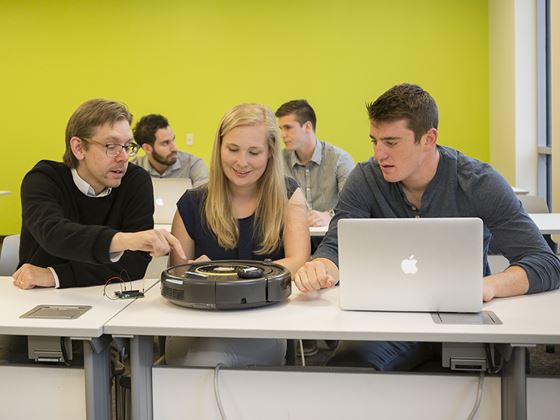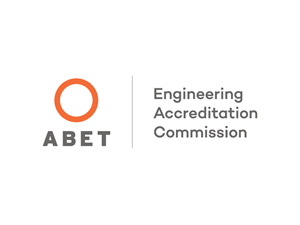-
Program Overview
A wide range of core engineering skills, a firm foundation across many disciplines, and a personalized learning experience to prepare you for your future in the field. That is what you’ll gain as a student in Endicott’s engineering program—the first four-year general engineering degree program on the North Shore.
Program Overview
Offering an interdisciplinary approach to engineering—with a hands-on focus—the program prepares you for careers in:
- Biomedical
- Civil
- Electrical
- Environmental
- Industrial
- Mechanical
You’ll leave Endicott equipped to take the Fundamentals of Engineering exam, the first step to leading in numerous engineering roles.
The engineering curriculum integrates coursework from other STEM areas and leverages our strong programs in applied mathematics, bioengineering, and computer science. You’ll take a set of core general engineering courses and explore many different electives—across disciplines—or choose to focus your electives and pursue one of our four program tracks.
Tracks include:
- Computer Engineering
- Energy and the Environment
- Mechanical Engineering
- Robotics
Request Information
Interested in learning more about our engineering programs? Request information today!

-
Curriculum
Curriculum Requirements - Minimum Credits Required: 128
First Year - Credits: 36
- Individual and Society General Education Requirement (Cr: 3)
- Global Issues General Education Requirement (Cr: 3)
-
CHE 105/105L - General Chemistry I and Lab (Cr: 4)
-
CHE 106/106L - General Chemistry II and Lab (Cr: 4)
-
EGR 100 - Introduction to Engineering (Cr: 3)
Satisfies the Science and Technology General Education Requirement.
-
EGR 200 - Engineering Computer Applications (Cr: 3)
-
ENG 111 - Critical Reading and Writing I (Cr: 3)
Satisfies Writing Designated Requirement.
-
ENG 112 - Critical Reading and Writing II (Cr: 3)
Satisfies Writing Designated Requirement.
-
INT 100 - Internship I (Cr: 2)
-
MTH 134 - Calculus I (Cr: 4)
Satisfies the Quantitative Reasoning General Education Requirement.
-
MTH 137 - Calculus II (Cr: 4)
Second Year - Credits: 31
- Aesthetic Awareness General Education Requirement (Cr: 3)
- Engineering Elective (Cr: 3)
- Values and Ethical Reasoning General Education Requirement (Cr: 3)
-
EGR 201 - Statics (Cr: 3)
-
EGR 210 - Introduction to Materials Science (Cr: 3)
-
INT 200 - Internship II (Cr: 2)
-
MTH 237 - Calculus III (Cr: 3)
-
MTH 330 - Ordinary Differential Equations (Cr: 3)
-
PHY 201/201L - Physics with Calculus I and Lab (Cr: 4)
Satisfies General Education Elective above the 100 Level Requirement.
-
PHY 202/202L - Physics with Calculus II and Lab (Cr: 4)
Satisfies General Education Elective above the 100 Level Requirement.
Third Year - Credits: 31
- World Cultures General Education Requirement (Cr: 3)
- Literary Perspectives General Education Requirement (Cr: 3)
- General Education Electives (Cr: 3)
-
EGR 305/305L - Introduction to Circuits and Electronics Lab (Cr: 4)
-
EGR 310/310L - Strength of Materials and Lab (Cr: 4)
-
EGR 315 - Introduction to Systems Engineering (Cr: 3)
-
EGR 320/320L - Instrumentation and Data Acquisition and Lab (Cr: 4)
-
EGR 330 - Thermodynamics (Cr: 3)
-
EGR 379 - Semester Internship Strategies (Cr: 1)
-
EGR 450 - Mathematical Modeling for Engineers (Cr: 3)
Fourth Year - Credits: 30
- General Education Electives (Cr: 3)
- Engineering Electives (Cr: 9)
-
EGR 480 - Semester Internship (Cr: 12)
-
EGR 489 - Senior Research (Cr: 3)
-
EGR 491 - Senior Capstone (Cr: 3)
Engineering Electives - 12 credits
- Any BEN or EGR Elective above 100-level
- *EGR220 may be repeated for up to 3 credits total covering different topics.
- Any CSC Course
-
ARC 220 - Electronic Media I (Cr: 3)
-
ENV 212 - Introduction to Geographic Information Systems (Cr: 3)
Program Educational Objectives
After graduation, engineering graduates should demonstrate the following abilities:
- Lifelong Learning - to pursue professional and personal development by obtaining professional licensure, certifications, post-graduate study or other means as appropriate to meet and adapt to emerging and evolving societal challenges.
- Innovation - to have a successful career as an engineer or other professional and welcome cross-discipline innovation, entrepreneurship and a willingness to take intellectual risks.
- Professional, Inclusive and Broad Minded - to contribute to the field of engineering or a related field as a professional by mentoring and other forms of service, celebrating the rich dimensions of diversity contained within each individual and applying the principles of liberal arts and engineering to support community.
Learning Outcomes
Upon completion of the engineering program students will demonstrate:
- An ability to identify, formulate, and solve complex engineering problems by applying principles of engineering, science, and mathematics.
- An ability to apply engineering design to produce solutions that meet specified needs with consideration of public health, safety, and welfare, as well as global, cultural, social, environmental, and economic factors.
- An ability to communicate effectively with a range of audiences.
- An ability to recognize ethical and professional responsibilities in engineering situations and make informed judgments, which must consider the impact of engineering solutions in global, economic, environmental, and societal contexts.
- An ability to function effectively on a team whose members together provide leadership, create a collaborative and inclusive environment, establish goals, plan tasks, and meet objectives.
- An ability to develop and conduct appropriate experimentation, analyze and interpret data, and use engineering judgment to draw conclusions.
- An ability to acquire and apply new knowledge as needed, using appropriate learning strategies.
View academic catalog and learning outcomes -
Internships and Careers
An Endicott education means you'll graduate with a degree and a resume.
Whether you pursue graduate school or embark on your career right away after graduation, we believe that your time at Endicott will prepare you for the next step.

Program Accreditations
Endicott College’s Bachelor of Science in Engineering program is accredited by the Engineering Accreditation Commission of ABET, https://www.abet.org, under the commission’s General Criteria with no applicable program criteria.





